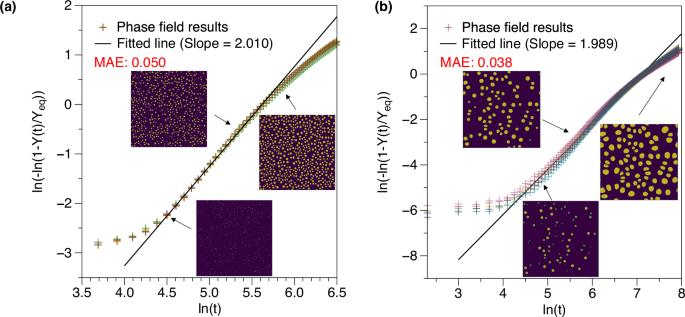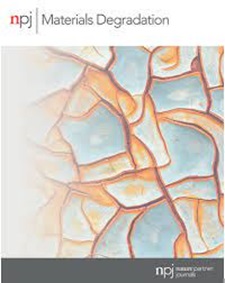A data-driven strategy for phase field nucleation modeling
IF 7.6
2区 材料科学
Q1 MATERIALS SCIENCE, MULTIDISCIPLINARY
引用次数: 0
Abstract
We propose a data-driven strategy for parameter selection in phase field nucleation models using machine learning and apply it to oxide nucleation in Fe-Cr alloys. A grand potential-based phase field model, incorporating Langevin noise, is employed to simulate oxide nucleation and benchmarked against the Johnson-Mehl-Avrami-Kolmogorov model. Three independent parameters in the phase field simulations (Langevin noise strength, numerical grid discretization and critical nucleation radius) are identified as essential for accurately modeling the nucleation behavior. These parameters serve as input features for machine learning classification and regression models. The classification model categorizes nucleation behavior into three nucleation density regimes, preventing invalid nucleation attempts in simulations, while the regression model estimates the appropriate Langevin noise strength, significantly reducing the need for time-consuming trial-and-error simulations. This data-driven approach improves the efficiency of parameter selection in phase field models and provides a generalizable method for simulating nucleation-driven microstructural evolution processes in various materials.

相场成核建模的数据驱动策略
我们提出了一种利用机器学习在相场成核模型中选择参数的数据驱动策略,并将其应用于铁铬合金中的氧化物成核。我们采用了一种基于大电势的相场模型,其中包含了朗格文噪声,用于模拟氧化物成核,并与约翰逊-梅尔-阿夫拉米-科尔莫戈罗夫模型进行了比较。相场模拟中的三个独立参数(朗格文噪声强度、数值网格离散化和临界成核半径)被认为是准确模拟成核行为的关键。这些参数可作为机器学习分类和回归模型的输入特征。分类模型将成核行为分为三个成核密度区,防止在模拟中出现无效的成核尝试,而回归模型则估算出适当的朗格文噪声强度,大大减少了耗时的试错模拟。这种数据驱动方法提高了相场模型中参数选择的效率,并为模拟各种材料中成核驱动的微结构演变过程提供了一种通用方法。
本文章由计算机程序翻译,如有差异,请以英文原文为准。
求助全文
约1分钟内获得全文
求助全文
来源期刊

npj Materials Degradation
MATERIALS SCIENCE, MULTIDISCIPLINARY-
CiteScore
7.80
自引率
7.80%
发文量
86
审稿时长
6 weeks
期刊介绍:
npj Materials Degradation considers basic and applied research that explores all aspects of the degradation of metallic and non-metallic materials. The journal broadly defines ‘materials degradation’ as a reduction in the ability of a material to perform its task in-service as a result of environmental exposure.
The journal covers a broad range of topics including but not limited to:
-Degradation of metals, glasses, minerals, polymers, ceramics, cements and composites in natural and engineered environments, as a result of various stimuli
-Computational and experimental studies of degradation mechanisms and kinetics
-Characterization of degradation by traditional and emerging techniques
-New approaches and technologies for enhancing resistance to degradation
-Inspection and monitoring techniques for materials in-service, such as sensing technologies
 求助内容:
求助内容: 应助结果提醒方式:
应助结果提醒方式:


